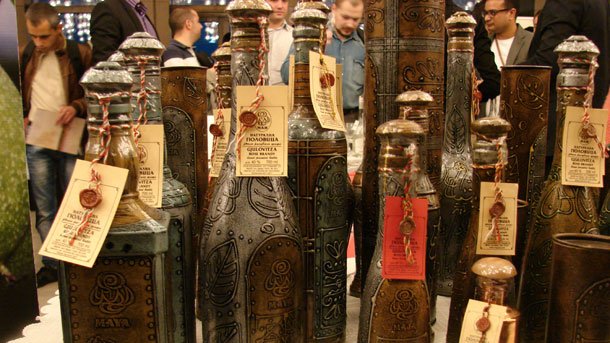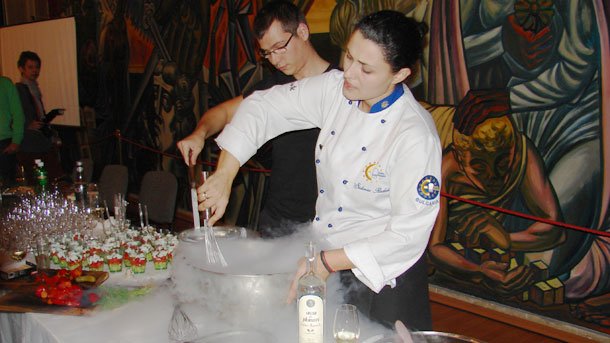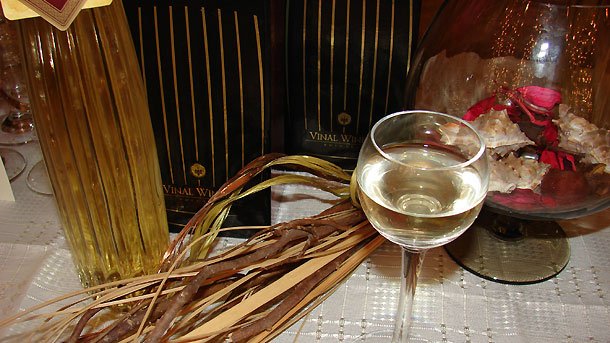Rakia (grape brandy) is not only traditional alcoholic beverage for the people living on the Balkans, but also a remedy which often causes national pride. This was realized by the guests of the first edition of the Balkan Rakia Fest held between October 24 and 26 in the National Palace of Culture in Sofia. All visitors enjoyed the taste of over 150 types of fruit and aniseed mature rakia brandy. Master classes were organized for all experts in this field and Berkovitsa Brass Orchestra took good care of the visitors’ mood during the second day of the festival.

© Photo: Maria Peeva
What is rakia brandy? It is a beverage with a very high alcohol content made through distillation of fermented fruit. Stoyan Vasilev who is a trade representative of four wine cellars in North Eastern Bulgaria tells us about the secrets of making this elixir:

© Photo: Maria Peeva
“When speaking of rakia we can definitely say that this is a beverage with high alcohol content which has been brewed on the Balkans since time immemorial. The beverage manufactured in our factories has an alcohol content of 40 °, while some homemade brandies can reach up to 60° proof. Bulgarians view all types of rakia under 35° proof as weak beverage and call it dzhibrovitsa. The strong one is usually called skorosmartnitsa (one that causes instant death). People say that those who have not tried this type of rakia have not lived and those who drink too much of it will not live long. Usually most of the rakia brandy in Bulgaria is homemade and almost all people who live in the villages have their own pots for making rakia. They use mainly grapes and fruit such as plums, apples, cherries, apricots and quince. The pots where rakia is distilled are usually made of copper and people often polish them with honey in the inside prior to making rakia. Bulgarians mix the fruit with some sugar first to ferment. The process of rapid fermentation lasts between one and three weeks. Then people wait another one to two weeks for the slow fermentation to finish and then start to turn this fruity mixture into rakia. When the brewing starts the first liter needs to be thrown away, because it contains methanol which is quite harmful. The freshly-brewed rakia is not good for immediate consumption. It needs to rest for some time. It can mature in oak or cherry barrels where rakia acquires specific taste. To make it colored, people usually add some herbs, plums or walnuts to it.”

© Photo: Maria Peeva
Professional chef Sidonia Radeva views rakia as an important part of the table of all Bulgarians, but is not so widely used in cooking:
“Bulgarians definitely drink rakia before the main meal with various meat appetizers, salads, pickled vegetables, tomato and pepper chutneys and roast meat when consumed in male companies. You can hardly see a Bulgarian who ends his meal with grape brandy. However, in my restaurant all foreign guests finish their meal with rakia which is a perfect digestive. You can cook absolutely everything with rakia. If you add a tablespoon of rakia to your bean casserole you will find out that it is cooked faster. If you make beef stew, rakia will make the meat more tender. If you have a ready-cooked meat and want to impress your guests, heat up around 30 grams of rakia, spread it over the meat and light it up on the table. This is the so-called flaming which gives a more intense flavor to the meat.”

© Photo: Maria Peeva
Mrs Burcak Desombre from Turkey arrived especially for the first edition of the Balkan Rakia Fest. She is a certified sommelier at the Court of Master Sommeliers. Here is what she said with regard to the peculiarities in the manufacture and consumption of Turkish rakia:
“Raka is an alcoholic beverage made of grapes and sultanas which ferment and are later distilled. During the second distillation we add aniseed of the type Pimpinela Anisum. Usually raka is 45 proof and is consumed mixed with water. I tried various fruit drinks at the festival and learned for the first time here that rakia can be made without aniseeds. I was quite impressed, because in our country aniseed is a must when we make this beverage. Raka in Turkey is consumed with various salads, cheeses, watermelons, melons, white chick-peas and to the accompaniment of our traditional music. We have many jokes and phrases linked with raka such as: “I want to be a fish in a raka bottle” or “let us dring raka, we are not in the mosque”. When we have a certain problem, we often say “Let us ask the older one (i.e. the raka) for advice”, which is a type of association with the raka bottle. When we call a friend, we say “Let us meet in the company of raka-appetizer”, which stands for a ten-hour meeting with lots of drinking and eating”, concludes Burcak Desombre.

© Photo: Maria Peeva
Barmen from the Balkans try to include rakia in the night life of this region. People can now often try interpretations of famous cocktails such as Mohito, Sex on the Beach and Tequilla Sunrise transformed into Rakito, Raki on The Beach and Rakia Sunset. We recommend you for the forthcoming cold winter nights a Greek recipe of heated rakia called Rakomelo. You need to heat up 150-200 milligrams of rakia, add 2-3 tablespoons of honey, two cardamom seeds and a cinnamon stick. This great drink is consumed with good friends. Cheers!
English version: Kostadin Atanasov
From February 14 to 16, an event under the motto "Love and Wine" will allow Sofia residents and guests of the city to combine the Bulgarian holiday of wine Trifon Zarezan with Valentine's Day. It will be held on the pedestrian zone..
World Radio Day - 13 February, this year is dedicated to climate change. The choice is no coincidence—2025 has been identified by the Paris Agreement as a crucial year for humanity to achieve its long-term goal of limiting global warming to a maximum of..
“On 13 February this year, Bulgarian consumers must not shop at any of the grocery stores, at any of the chain stores, at any of the supermarkets! On 13 February grocery stores must be left empty, with not a single buyer in them,” the organizers..
Exactly a month after the Bulgarian National Radio solemnly celebrated its 90th anniversary, history continues its dialogue with us, its authors. With a..

+359 2 9336 661
